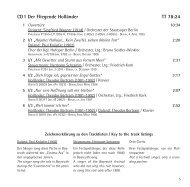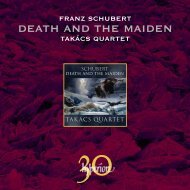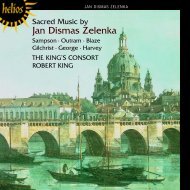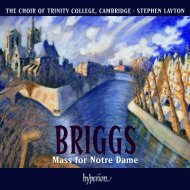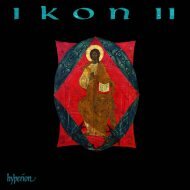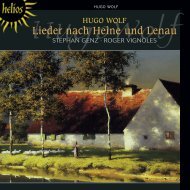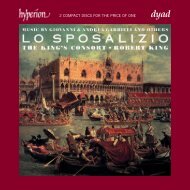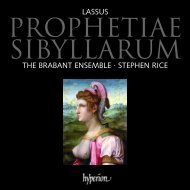CHORAL MUSIC BY JONATHAN DOVE - Abeille Musique
CHORAL MUSIC BY JONATHAN DOVE - Abeille Musique
CHORAL MUSIC BY JONATHAN DOVE - Abeille Musique
You also want an ePaper? Increase the reach of your titles
YUMPU automatically turns print PDFs into web optimized ePapers that Google loves.
text whilst the choir sings the refrain words as accompaniment.<br />
The third king is introduced mysteriously but, out of<br />
the blue, Dove throws the music into an energetic scherzo<br />
as he describes the golden baubles and the excitement of<br />
the child’s response in receiving them. The piece ends in<br />
quiet reflection.<br />
Run, shepherds, run! is a completely different conception<br />
and underlines Dove’s preoccupation with and feel<br />
for drama and the dramatic. This was another Spitalfields<br />
Festival commission, this time celebrating the life of<br />
Christopher Robert Vaughan, who died in his late thirties.<br />
Vaughan was a local resident in Spitalfields and Patron<br />
of the Festival who left part of his estate to funding<br />
the Festival’s ‘Learning and Participation’ programme.<br />
(This was not the only work commissioned from Jonathan<br />
Dove in memory of Vaughan as he was also asked to<br />
write a community cantata On Spital Fields to celebrate<br />
Vaughan’s life.) The poem—‘The Angel’s Song’ by William<br />
Drummond of Hawthornden (1585–1649), from a collection<br />
called Flowers of Sion—is energetic and ideal for<br />
Dove’s purposes. The music was written to be performed<br />
with audience participation and they need to be taught<br />
their ‘refrain’ before the performance. In fact the music is<br />
quite complex as the audience part is divided up as the<br />
piece progresses, first into two parts and then into four<br />
parts, all of whom sing with a section of the choir. As Dove<br />
writes in his preface: ‘The four-part division presents the<br />
audience with quite a challenge: it may result in a degree<br />
of happy chaos, but this is all part of the fun.’ Wells<br />
Cathedral Choir take no such risks on this recording; the<br />
highly trained Wells Cathedral School Chapel Choir act as<br />
the ‘audience’ and all is well!<br />
The main theme that runs throughout is also taken by<br />
the audience. Dove treats it in a number of different ways<br />
and, imaginatively (and helpfully), before the audience’s<br />
first entries their phrases are sung strongly by the choir,<br />
5<br />
which they then imitate. The model for much of this piece<br />
is Britten’s A Boy was Born in which he has a constantly<br />
repeated energetic figure passed around the vocal parts<br />
over which is sung a binding longer-note melody (sung by<br />
the boys’ choir in Britten’s case). The result is very exciting<br />
and strongly energized.<br />
Ralph Allwood is well known for his influential summer<br />
choral courses at Eton College. He commissioned Dove to<br />
write an anthem for the 1997 course at Eton and Dove<br />
responded with Ecce beatam lucem, a setting of words<br />
which, in a prefatory note, Dove says were possibly written<br />
by Alessandro Striggio (1540–1592). Striggio wrote a fortypart<br />
motet setting these words which is often coupled with<br />
the more famous one by Tallis. It is an ecstatic poem in<br />
praise of light and its source from the sun, the moon and<br />
the stars which are all created by God. The music is<br />
underpinned by a series of fast-moving and constantly<br />
repeated keyboard figures on the organ as the choir moves<br />
between slower-moving lyrical phrases and quickly<br />
imitative figures thrown from voice to voice. The final<br />
section (‘O mel et dulce nectar’), in a slower, reflective<br />
mood, leads to the final beautiful bars, which Dove marks<br />
to be ‘slow and serene.’<br />
In beauty may I walk was composed as a leaving<br />
present for Anthony Whitworth Jones, a great supporter of<br />
Dove’s who commissioned him to compose numerous<br />
works for the Glyndebourne Festival including the opera<br />
Flight, on his departure from Glyndebourne in August<br />
1998. This is a short and simple setting of anonymous<br />
words from the Navajo translated by the American poet<br />
Jerome K Rothenberg, who made a remarkable job of the<br />
almost untranslatable. The Navajo is a huge tribe of North<br />
American Indians whose reservation (mostly in Arizona) is<br />
the largest in the United States. The Navajos have never<br />
stopped speaking their native Athabaskan language which<br />
is spoken only on the Navajo reservation. Until recently it



